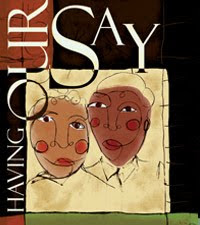Having Our Say

The McCarter Theater, which is my local regional theater, is celebrating twenty years with Emily Mann as Artistic Director. Accordingly, they are remounting a production of one of her most popular plays, Having Our Say: The Delany Sisters' First 100 Years. Mann wrote and directed, based on a book by Sarah L. Delany and A. Elizabeth Delany with Amy Hill Hearth. It was first done in 1995, before I moved here, so this was my first time seeing it.
It's not hard to see why it's so popular. The cast consists of two women playing sisters, who were born to parents who had been slaves, and who both lived to over 100 years old. They died in the 1990s, but both lived to see the play done on Broadway.
Mann wisely crafts the play as two elderly women hosting us, the audience, as guests in their home. They then tell the story of their lives, taking time out to bicker a bit and then prepare their dinner. One of the dishes is macaroni and cheese, and Having Our Say is something of a theatrical version of that dish--it's comfort food. Who wouldn't be charmed by funny women who had seen so much of American history, and who isn't moved by hearing their stories contrasted with multimedia images of the African-American struggle, from Booker T. Washington to Martin Luther King?
Having Our Say does suffer a bit from being too nice. One of the sisters, Bessie, who was one of the first black women to earn a degree in dentistry, is the more spirited, who was less likely to take guff from white people. She tells a chilling story of how she insulted a white man in a Georgia train station and felt she narrowly escaped being lynched. But aside from the occasional angry declarations, the evening is no more pointed than spending a pleasant afternoon with your elderly aunts. They are good company, but it's worlds away from spending an evening with say, George and Martha from Who's Afraid of Virginia Woolf, or the Tyrone family of Long Day's Journey Into Night.
The sisters lived their whole lives together (and never married), first in the south, then in Harlem during the jazz age. They knew almost every famous colored person of the era (they preferred the term colored, or Negro, rather than black or African-American), such as W.E.B. DuBois and Paul Robeson. I was most moved by their recounting of the excitement that their mother felt upon meeting Eleanor Roosevelt, who was their favorite "famous white person." The Delany sisters had quite a bit of white blood in them as it was, as they had a white grandfather who cohabited with their black grandmother (they were legally barred from marrying). As they put it, any white person who lived in the south likely had colored blood in them.
The acting is exquisite. Lizzan Mitchell is the more refined Sadie, while Yvette Freeman is the feisty Bessie. Of course neither of these actresses are close to being 100 years old, but I thought Mitchell was more convincing as someone of that age--Freeman was more vital. She didn't look a day over eighty.
The set design by Daniel Ostling and lighting design by Stephen Strawbridge were also first rate. This was a satisfactory, if not middlebrow, evening of theater.


Comments
Post a Comment